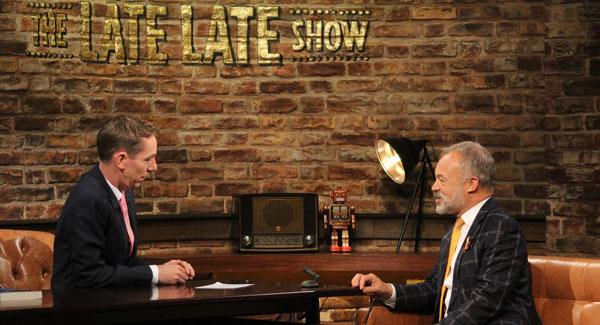People bought a “pack of lies” on Brexit, Graham Norton told The Late Late Show last night.
The chatshow host told Ryan Tubridy that he was “astonished” that people had voted for Brexit and he lamented the impact on Britain’s young people.
“I was astonished that people bought the pack of lies they were sold and I feel sorry for the people who voted for it because they were lied to. They were promised things that are never going to happen and they were told [about] the things that are now unfolding: ‘oh don’t worry, that won’t happen’,” he said.
Norton said that although people will focus on the economy, it is the impact of Brexit on young people that was “the most depressing thing”.

“What is great about being young is you’ve so many options. Life – all the doors are open, every door is open,” he said.
“What is so sad about Brexit is that people over 60, because it was people over 60 passed that thing, closed so many doors on young people and shut down options.
“Shut down options about studying abroad, living abroad, working in places. It just seemed absolutely the wrong instinct.
“Don’t make the world smaller, don’t shut things down. I understand where the fear comes from but, actually, I think it is sad.”
The British should have taken Ireland’s lead and run the referendum again, he added.
“You do think: ‘do you not see what they do in Ireland?’ If you get the wrong answer, you ask again! It was a no brainer” Norton said.
The host of Britain’s most popular chatshow, Norton said that after 19 years at the helm he is “almost offended” that he hasn’t been targetted by the media like other big name BBC personalities.
“It is sort of in my mind a bit more because of the BBC, the nature of the BBC and the way that the BBC is funded,” he said.
“The papers, it is like there is a whiteboard in the office and they have names on it: ‘who are we going to get next?’ – Jonathan Ross – boom; Jeremy Clarkson – boom; Chris Evans – boom.
“I am almost offended they haven’t come for me yet but they have to be on their way! Just to give the BBC a kicking and to say ‘right, we’ll get rid of him then’.”
Moving from Channel 4 to the BBC brings a different dynamic to how your work is received, he added.
“You realise the papers will always hate the BBC more than you. So, even if you get a bad review, the BBC are terrible for showing it. Somehow it is their fault, not yours. Whereas on a commercial broadcaster like Channel 4, it’s your fault, you’ve done that thing,” he said.


